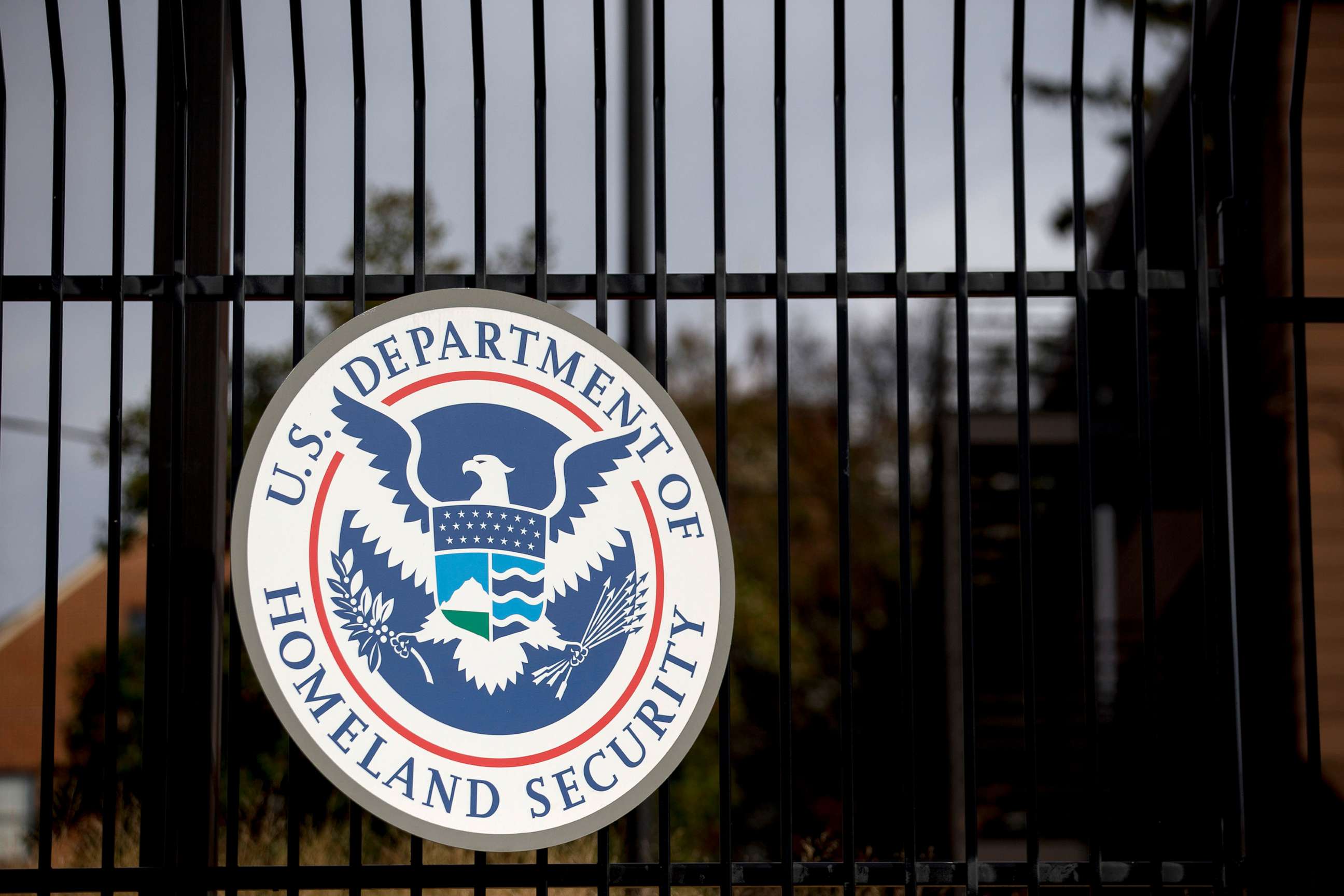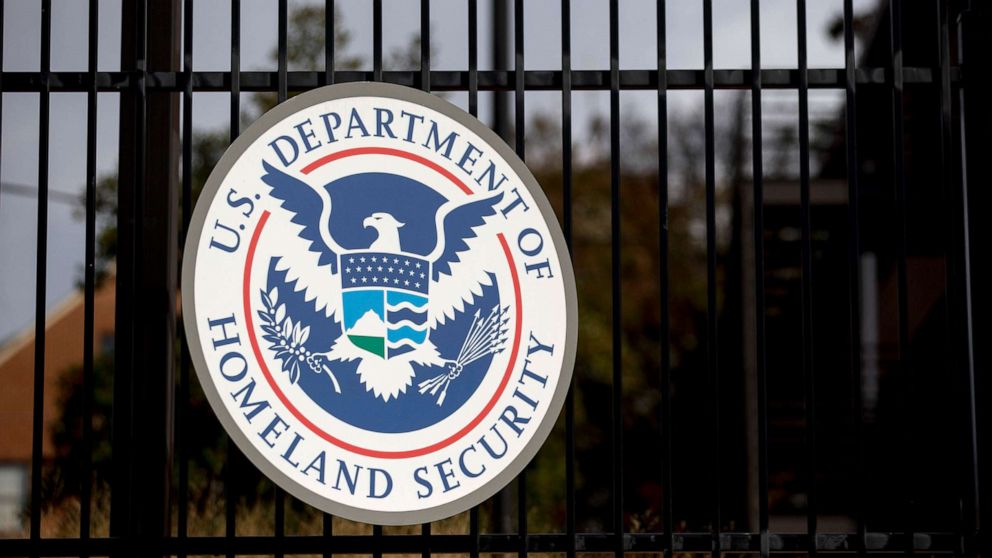The 2024 presidential election is likely to face a complicated array of threats, from voter manipulation to physical violence, according to a new federal assessment — and authorities are already trying to figure out how to handle them.
The confidential analysis, compiled by the Department of Homeland Security, outlines concerns about online activity that could threaten the election’s legitimacy, potential real-world plots that could result in attacks — and the urgent need to thwart them in time.
“Threat actors intent on harming Americans through the use of violence may become more aggressive as Election Day approaches and may seek to engage in or provoke violence at voting locations, government facilities, public meetings, ballot drop box locations, or private-sector vendor locations that support elections,” according to the Jan. 2 DHS bulletin, obtained by ABC News.

In this Dec. 11, 2014, file photo, the U.S. Department of Homeland Security (DHS) seal hangs on a fence at the agency’s headquarters in Washington, D.C.
Andrew Harrer/Bloomberg via Getty Images, FILE
The risk looms far beyond the security at local polling places, the document notes, from attempts to “intimidate election workers or election officials,” to potential cyber attacks on “election infrastructure, campaigns, candidates, public officials or political organizations,” to foreign influence operations “designed to undermine” the democratic “processes and institutions, steer policy, sway public opinion or sow division.”
The new assessment comes more than nine months before Election Day, as partisan tensions at home are already at a fever pitch, multiple wars are being waged abroad and political violence has already broken out overseas.
“We are heading into a highly dangerous, perfect storm,” said John Cohen, the former intelligence chief at the Department of Homeland Security, now an ABC News contributor.
“It’s not simply due to the fact that foreign and domestic threat actors will seek to exploit this election to achieve their ideological and geopolitical objectives. We can also expect the political discourse associated with this election will become even more polarized, more angry and more divisive. And all those factors together is what has law enforcement concerned.”
The 2024 race has been marked by increasingly toxic rhetoric, the intermingling of inflammatory campaign trail hyperbole and courtroom theatrics as former President Donald Trump faces four criminal trials, and the continued conflicts in the Middle East and Ukraine. In addition, hate speech, misinformation and disinformation are running rampant on social media, and rapidly evolving technology remains vulnerable, experts say.
Domestic extremists “likely remain emboldened” following the last presidential election, which was punctuated on Jan. 6, 2021, with the insurrection at the U.S. Capitol, the bulletin notes.
And on both sides of the aisle, leading candidates are running on some of the most divisive issues – from abortion, to culture wars, to immigration at the Southern border – which authorities note could prove to be flashpoints.
“Elections that involve candidates connected to issues that historically have prompted violence — including COVID-19 mandates, firearms restrictions, or abortion access — face a heightened threat environment,” the analysis said. “DHS is concerned with identifying and disrupting possible violent acts perpetrated by entities or individuals as retribution for perceived unfavorable outcomes before or following the elections.”
Election officials like Maine Secretary of State Shenna Bellows, as well as the head of the federal government’s election security agency, Cybersecurity and Infrastructure Security Agency Director Jen Easterly, have already been victims of swatting incidents, as have some officials overseeing and involved in Trump’s cases. Separately, the FBI fielded “numerous” fake bomb threats in early January sent to various secretaries of state and state legislatures.
“We’re constantly being vigilant for – what’s the tipping point?” said Elizabeth Neumann, who was a DHS assistant secretary during the first years of Trump’s presidency and is now an ABC News contributor. “There are barrages of threats coming from multiple vectors – and multiple components of election infrastructure. It’s not just the voting machine – there’s multiple pieces that you’re worried about.”

A voter fills out their ballots on Jan. 23, 2024 in Loudon, N.H.
Tasos Katopodis/Getty Images
The complex interplay of state and local election systems also means “different potential threat vectors and areas for protection,” the DHS bulletin said.
Online threat actors “seek to undermine the confidentiality, integrity, and availability of US election infrastructure,” the bulletin said – through phishing, IT disruptions, credential harvesting, supply chain compromise or brute force attacks.
Cyber attacks on local election infrastructure “have the potential for the greatest impact on the ability of jurisdictions to conduct elections,” the document said – attacks “on the integrity of state-level voter registration, poll books, and election websites, as well as on the preparation of ballots, voting machines, and tabulation systems.”
Threats may also target “agencies or civic organizations responsible for registering voters” or whose “infrastructure may feed into” those systems, the analysis said.
“These threats are not hypothetical. We’ve seen them occur. It may not have been such that it disrupted the election. But they still can have deep impacts,” Neumann said.
During the 2022 election cycle, the Elections Infrastructure Information Sharing and Analysis Center received at least 85 reports of malicious cyber activity from election offices across 56 state, local, tribal and territorial entities, attempting to “find and exploit cybersecurity vulnerabilities,” the bulletin said.
“Just because we’ve shored up important vulnerabilities doesn’t mean new vulnerabilities can’t be introduced,” Neumann said. “The spectrum here is wide, and exponentially expanding.”
Would-be hackers’ incursion into election infrastructure is not the only threat lurking online: the mushrooming influence of false and misleading information on the internet could sway voters’ minds even before they reach the ballot box, the document warns.
Foreign governments could attempt “to influence US policy, distort political sentiment and public discourse, sow division, or undermine confidence in democratic processes and values to achieve strategic objectives,” the bulletin said – advising to look out for “indications that entities are producing or amplifying misleading information about the time, manner, or place of voting, including providing inaccurate election dates or false claims about voting qualifications or methods.”
Foreign actors could try to “influence US voters through psychological operations, the infiltration of political parties, or the covert dissemination of false or misleading information through social media or other means,” the document said.
Just before New Hampshire’s first-in-the-nation primary earlier this month, a fake robocall appearing to impersonate the voice of President Joe Biden began circulating, encouraging voters not to go to the primary polls and to “save your vote” for the general election.
“Your vote makes a difference in November, not this Tuesday,” the recording said – prompting a criminal investigation by New Hampshire’s Attorney General.
“You don’t have to hack into voter tabulation systems to disrupt an election,” Cohen said. “If a foreign adversary, or a terrorist group, can misinform voters, in a way that influences their opinions and decision-making before they enter or as they enter the ballot box, then these adversaries can influence the outcome of the election.”

